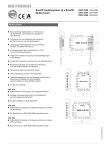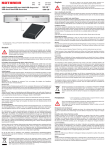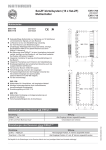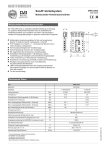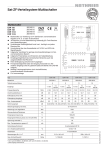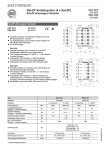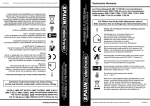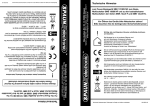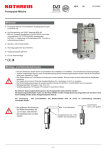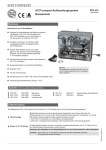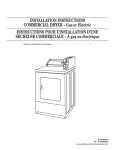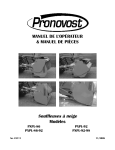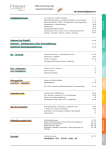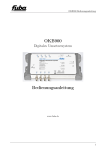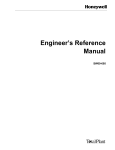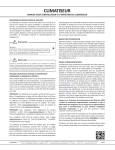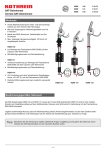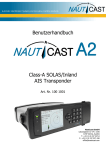Download Kathrein EXR 334
Transcript
EXR 308 BN 273348 EXR 334 BN 273349 VWS 330 BN 230599 NCF 18 BN 230636 Sat-ZF-Verteilsystem 2 x Sat + terrestrisch Zur Beachtung: Die beschriebenen Geräte dienen ausschließlich der Installation für Satelliten-Empfangsanlagen. Jegliche anderweitige Nutzung oder Nichtbeachtung dieses Anwendungshinweises hat den Verlust der Gewährleistung bzw. Garantie zur Folge. Kaskadierfähiges Sat-ZF-Verteilsystem zur Verteilung von Sat-ZF-Signalen (beide Polarisationen eines Satelliten) und terrestrischen Signalen auf viele Receiver. Terrestrischer Empfang auch bei ausgeschalteten Sat-Receivern möglich. Je nach Kabellänge können Systeme mit bis zu 16 Anschlüssen ohne Kaskadierverstärker aufgebaut werden. Je Receiver ist nur eine Niederführung notwendig. Für Twin-Receiver sind zwei Niederführungen notwendig. Netzteil NCF 18 mit hohem Wirkungsgrad. Umschaltung horizontal/vertikal über das Koaxialkabel durch 14/18 V-Versorgungsspannung. Die Stromversorgung der LNB erfolgt je nach Anwendungsfall über EXR 308, VWS 330 oder WFS 330. Das Sat-ZF-Verteilsystem stimmt mit den z. Zt. gültigen Anforderungen der Richtlinie 73/23/EWG und 89/336/EWG überein. EXR 308 K001 112 Beschreibung der Bauteile: EXR 308 – End-Umschaltmatrix für 8 Anschlüsse (wird pro Anlage 1 x benötigt), komplett mit Netzteil NCF 18. EXR 334 – Durchschleifmatrix zur Erweiterung um jeweils 4 Anschlüsse, komplett mit 3-fach Verbindungselement. EXR 334 VWS 330 – Verteilnetzverstärker komplett mit Netzteil NCF 18 und 3-fach-Verbindungselement. Je nach Kabellänge wird damit der Ausbau um 3 zusätzliche EXR 334 ermöglicht. VWS 330 935.1841/C/0805/1.4d NCF 18 – Netzteil als Beipack bei EXR 308 bzw. VWS 330. Technische Daten Typ Bestell-Nr. Frequenzbereich Eingänge/Ausgänge/ Teilnehmer-Anschlüsse Durchgangsdämpfung Anschlußdämpfung Verstärkung Max. Ausgangspegel (Störprodukt 3. Ordnung) Max. Betriebspegel Stromaufnahme aus dem Netzteil Stromaufnahme aus dem Receiver je Teilnehmer Max. Stromentnahme über den 14 V-Anschluß (nicht kurzschlußfest) Typ / Bestell-Nr. Eingangsnennspannung zul. Eingangsspannungsbereich Spannung sekundär Stromentnahme Eingangsnennleistung Schutzklasse/Schutzart EXR 308 EXR 334 273348 47–862 950–2400 3/-/8 MHz dB dB dB dBµV – 9 – 851) dBµV mA mA – mA 47–862 – 10 – 852) 3 17 – – – – 230599 950–2400 3/3/4 47–862 950–2400 3/3/- 3 13 – 852) – – 13 1101) – 1053) – – 11 1102) 984) 150 1 40 20 120 – 150 – 300 NCF 18 / 230636 230 (50–60 Hz) 198–253 18 ± 5% max. 650 typ. 14,5 II (schutzisoliert)/IP 30 V~ V~ V= mA W ) 60 dB KMA / 3-Sender-Meßverfahren nach DIN 45004 B ) 35 dB IMA / 2-Sender-Meßverfahren nach EN 50083-3 VWS 330 273349 ) bei Belegung mit 6 TV-Kanälen und FM ) bei Belegung mit 32 TV-Kanälen pro Polarisation 1 3 2 4 Hinweise – Bei Anlagenplanungen mit mehr als 4 Anschlüssen ist grundsätzlich einmal die Umschaltmatrix EXR 308 (enthält das Netzteil für die LNB- und Matrizen-Versorgung) einzuplanen. Sie wird als letzte Matrix im Verteilnetz eingesetzt. Für jeweils 4 zusätzliche Anschlüsse ist eine Durchschleifmatrix EXR 334 notwendig. Beispiel: 16 Anschlüsse = 1 x EXR 308 + 2 x EXR 334. Je nach Empfangspegel und Kabeldämpfung können bis zu 16 Anschlüsse ohne Sat-Verteilnetzverstärker VWS 330 realisiert werden. – Nicht belegte HF-Ausgänge müssen zur Einhaltung der EMV-Anforderungen mit Abschlußwiderstand EMK 03 abgeschlossen werden. – Bei Einsatz eines Verteilnetzverstärkers VWS 330 erfolgt die LNB-Stromversorgung und die Versorgung der davorgeschaltenen Matrizen vom Netzteil des Verstärkers aus. Die Stromversorgung der nachgeschalteten Matrizen kann sowohl von der End-Umschaltmatrix EXR 308 wie auch vom 2. DC-Anschluß des Verstärkers erfolgen. (= zugleich interne Versorgungsspannung von VWS 330) Möglichkeiten der LNB-Stromversorgung 650 mA für LNB Davon max. 300 mA über den 14 V-Anschluß Zur Ermittlung des gesamten Strombedarfes sind alle aktiven Komponenten zu berücksichtigen. 935.1841/C/0805/2.4d 650 – 150 = 500 mA für LNB Davon max. 200 mA über den 14 V-Anschluß Anwendungsbeispiele Weitere Anwendungs- und Installationsbeispiele finden Sie in der Broschüre „Der Weg zu noch mehr Programmen“. Alle Angaben beziehen sich auf das Koaxialkabel LCD 90. Die maximale Kabellänge ist auf 2150 MHz bezogen. Sat-Gemeinschaftsanlage bis 20 Anschlüsse 2 Polarisationen analog und terrestrisch Mindestpegel am Eingang von EXR 334: Mindestpegel am Eingang von EXR 334: Sat VHF UHF Sat VHF UHF 75 dBµV 80 dBµV 90 dBµV Maximale Kabellänge: 42 m 75 dBµV 80 dBµV 90 dBµV Maximale Kabellänge: 50 m 935.1841/C/0805/3.4d Sat-Gemeinschaftsanlagen bis 16 Anschlüsse 2 Polarisationen analog und terrestrisch Montageort Das Sat-ZF-Verteilsystem darf nur in trockenen Innenräumen montiert werden. Nicht auf oder an leicht entzündlichen Materialen montieren. Zur Geräteentwärmung muß freie Luftzirkulation möglich sein. Die Geräte sind mit einer Potentialausgleichsleitung (Cu mindestens 4 mm2) zu versehen. Achtung: Die Sicherheitsbestimmungen nach EN 50083-1 + A1 und EN 60065 + A11 sind zu beachten. Vorzugsweise Wandmontage. Holzschrauben, max. 4 mm Ø Schraubkupplung 75 Ω (Serie F) nach EN 60169-24. Zulässiger Durchmesser des Kabelinnleiters: 0,6 – 1,2 mm, gratfrei Achtung Bei größerem Durch messer des Kabelinnenleiters als 1,2 mm bzw. Grat können die Gerätebuchsen zerstört werden. Montage – Stromführendes Gerät! – Nicht öffnen, nicht am Gerät manipulieren. – Bei Arbeiten an der Anlage Netzstecker ziehen. – Auf ausreichenden Abstand und Montagelage achten (siehe Abb.) Steckdose Montagelage Elektronische Geräte gehören nicht in den Hausmüll, sondern müssen - gemäß Richtlinie 2002/96/EG DES EUROPÄISCHEN PARLAMENTS UND DES RATES vom 27. Januar 2003 über Elektro-und Elektronik-Altgeräte fachgerecht entsorgt werden. Bitte geben Sie dieses Gerät am Ende seiner Verwendung zur Entsorgung an den dafür vorgesehenen öffentlichen Sammelstellen ab. KATHREIN-Werke KG · Anton-Kathrein-Straße 1–3 · Postfach 10 04 44 · D-83004 Rosenheim · Deutschland · Telefon (0 80 31) 18 40 · Telefax (0 80 31) 18 43 06 935.1841/C/0805/4.4d/SKS Irrtum und technische Änderungen vorbehalten. Montagelage: Befestigungsmittel: Verbindungsstecker: SAT IF Distribution System 2 x Sat + terrestrial EXR 308 BN 273348 EXR 334 BN 273349 VWS 330 BN 230599 NCF 18 BN 230636 The components mentioned ih these instructions are only destined for installation in satellite reception systems. Any other use or the non-observance of the insdtructions will entail the loss of guarantee or the liability claim on the manufacturer. Cascadeable Sat IF distribution system for the distribution of Sat IF signals (both polarisations from a satellite) and terrestrial signals on to many receivers. Terrestrial range is fully passive to allow reception also without switched-on Sat receiver. Depending on the cable length, it will be possible to feed the signals to 16 subscribers without using an amplifier. Each receiver needs only one coaxial cable leading to it. Twin receivers will need two cables. High efficiency power supply unit NVCF 18. Horizontal/vertical switch-over via the coaxial cable with 14/18 V supply voltage. Remote feeding of LNBs either via EXR 308, VWS 330 or WFS 330. The Sat IF components fulfil the requirements of the valid regulations 73/23/EEC and 89/336/EEC. EXR 308 K001 112 Description of the components: EXR 308 – End-line switching matrix for 8 subscribers (is needed once per system) supplied with power supply unit NCF 18. EXR 334 – Through-line switching matrix allows one to extend a system wit another 4 subscriber points, supplied with 3-way connection element. VWS 330 – Network Amplifier with separate power supply unit NCF 18 and 3-way connection element. Allows one to extend the network with 3 additional 4-way matrices EXR 334 (dependent on cable loss). EXR 334 VWS 330 935.1841/C/0805/1.4e NCF 18 – Power supply unit Is in the scope of delivery of EXR 308 and VWS 330. Technical data Type EXR 308 Order Nr. 273348 Frequency range MHz 47–862 950–2400 Inputs/Outputs/ 3/-/8 Subscriber connections Through loss dB – – Tap loss dB 9 10 Gain dB – – 852) max. output level dBµV 851) (3rd order prod.) max. operation level dBµV – – Current drain from power unit mA 150 Current drain from receiver mA 1 each subscriber max. current drain form DC connection mA 150 (not short-circuit proof) Type / Order Nr. NCF 18 / 230636 nominal input voltage V~ 230 (50–60 Hz) admissible input voltage range V~ 198–253 secondary voltage V= 18 ± 5% Current drain mA max. 650 Consumption W typ. 14,5 Safety class/Protection category II (Safety insulation)/IP 30 ) 60 dB X. mod. / 3 transmitter measurement method B acc. to DIN 450043 ) 35 dB I. mod./ 2 transmitter measurement method acc. to EN 50083-3 EXR 334 VWS 330 273349 47–862 950–2400 3/3/4 3 17 – – – 47–862 3 13 – 852) – – 13 1101) – 1053) 230599 950–2400 3/3/– – 11 1102) 984) 40 20 120 – – 300 ) distributing 6 TV channels and FM signals. ) distributing 32 TV channels each polarisation. 1 3 2 4 Note – Systems for more than 4 subscribers need be planned with at least one switching matrix EXR 308 (a power supply unit for remote power feeding to LNBs and the matrices is in the scope of delivery of EXR 308. The matrix is generally installewd as the final matrix in a distribution system. A through-line matrix EXR 334 is needed for system extension to another four subscribers. Example: 16 receivers = 1 x EXR 308 + 2 x EXR 334- Depending on the signal level and the cable loss, it will be possible to feed the signals to 16 receivers without having to use a Sat matrix amplifier VWS 330. – Not needed outputs have to be terminated with the resistor type EMK 03 to assure electromagnetic compatibility (EMC). – If a matrix system amplifier VWS 330 is used in a system, the LNB and the switching matrices in front of the amplifier receive the operating power from the power unit of the amplifier. The amplifier and the post-circuited matrices can be powered either via the switching matrix EXR 308 or via the second DC connection point on the amplifier. LNB current supply possibilities 650 mA for LNB max. 300 mA from 14 V connection point Connection point for LNB supply voltage or pre-circuited matrices Alternative connection point for power supply to amplifier or matrices from NCF 18 When calculating the totally required supply voltages, the current drain of all active components in the system must be taken into account. 935.1841/C/0805/2.4e 650 – 150 = 500 mA for LNB max. 200 mA from 14 V connection point Example Installations More example installations are found in the brochure „The easy route to more programmes“. All values refer to the use of the coaxial cable LCD 90. The maximum cable length is given for 2150 MHz signal distribution. Sat community antenna system (SMATV) for max. 16 subscribers, 2 polarisations analog and terrestrial terrestrial Antenna Sat community antenna system (SMATV) for max. 20 subscirbers, 2 polarisations, analog and terrestrial SAT-IF terrestrial Antenna SAT-IF Min. level on input of EXR 334: Min. level on input of EXR 334: Sat VHF UHF Sat VHF UHF Max. cable length: 42 m 75 dBµV 80 dBµV 90 dBµV Max. cable length: 50 m 935.1841/C/0805/3.4e 75 dBµV 80 dBµV 90 dBµV Mounting location The IF distribution components must only be installed in dry indoor locations. Do not install on or near to easily inflammable material. To guarantee good heat dissipation, the air must be able to circulate. The components must be grounded (Cu wire min. diam. 4 mm2) Mounting position: Mounting accessories: Connections: preferably wall mounted. Wood screws, max. 4 mm Ø Screw-on connector 75 Ω, Type F acc. to EN 60169-24. Admis. diameter of the centre conductor: 0,6 – 1,2 mm, free from burr. Attention: A centre conductor bigger than 1.2 mm or burr can damage the connectors of the component. Mounting – The component carries current! – Do not open nor manipulate the component. – Pull the mains plug when working on the system. – Install with enough distance to other components and observe the mounting position (see illustr.) Antenna socket Electronic equipment is not household waste – in accordance with directive 2002/96/EC OF THE EUROPEAN PARLIAMENT AND THE COUNCIL of 27th January 2003 on used electrical and electronic equipment, it must be disposed of properly. At the end of its service life, take this unit for disposal at a relevant official collection point KATHREIN-Werke KG · Anton-Kathrein-Straße 1–3 · Postfach 10 04 44 · D-83004 Rosenheim · Deutschland · Telefon (0 80 31) 18 40 · Telefax (0 80 31) 18 43 06 935.1841/C/0805/4.4e/SKS Subject to technical changes! Montagelage EXR 308 BN 273348 EXR 334 BN 273349 VWS 330 BN 230599 NCF 18 BN 230636 Système de distribution BIS 2 x Sat + terrestre Remarque: Les composants mentionnés dans cette notice sont destinés uniquement pour l’installation en systèmes de réception satellite. Toute auutre utilisation entraine la perte de garantie et dégage le fabircant de toute responsabilité. Système cascadable pour distribution de signaux BIS et terrestres (deux polarisations d’un satellite) vers un grand nombre d’abonnés. Réception des signaux terrestres est possible même si aucun récepteur satellite n’est en fonction. Selon la longueur du câble, les signaux peuvent être distribués à 16 utilisateurs sans amplificateur cascadé. Un seul câble coaxial est nécessaire par récepteur. Les récepteurs TWIN nécessistent 2 câbles. Bloc d’alimentation NCF 18 de grande efficacité. Commutation horizontale/verticale par le câble coaxial à partir du récepteur (14/18 V). Téléalimentation du LNB par EXR 308, ou VWS 330 ou WFS 330. Les composants du système BIS répondent aux spécifications 73/23/CEE et 89/336/CEE. EXR 308 K001 112 Description des composants: EXR 308 – Matrice terminale pour 8 abonnés, livrée avec bloc d’alimentation séparé NCF 18 (une matrice est nécessaire par système) EXR 334 – Matrice cascadable pour extension à 4 sorties complémentaires, livrées avec une pièce de jonction à 3 voies. EXR 334 VWS 330 – Amplificateur d’extension livré avec bloc d’alimentation séparé NCF 18 et une pièce de jonction à 3 voies. Selon la longueur du câble, permet l’extension du système avec 3 EXR 334. VWS 330 935.1841/C/0805/1.4f NCF 18 – Bloc d’alimentation Livré avec la matrice EXR 308 et l’amplificateur VWS 330. Données techniques Type No. Gamme de fréquency Entrées/Sorties/ Abonnées Affaiblissement de passage Affaiblissement de raccordement Gain Niv. de sortie, max. (prod. d’inter. 3ème ord.) Niveau d’opération, max. Courant consommé à partir de l’aliment. Courant consommé à partir du récepteur par abonnée Décharge de courant par la borne de 14 V (ne pas protége contre les court-circuits) Alimentation Tension d’entrée, nom. Plage de tension d’entrée admis. Tension sec. Courant consommé Consommation Classe de protection/Catégorie de protection MHz EXR 308 EXR 334 273348 47–862 950–2400 3/-/8 273349 47–862 950–2400 3/3/4 dB dB dB dBµV – 9 – 851) dBµV mA mA – mA – 10 – 852) 3 17 – – – – 47–862 3 13 – 852) – – 13 1101) – 1053) 230599 950–2400 3/3/– – 11 1102) 984) 150 1 40 20 120 – 150 – 300 NCF 18 / 230636 230 (50–60 Hz) 198–253 18 ± 5% max. 650 typ. 14,5 II (Isolation protectrice)/IP 30 V~ V~ V= mA W ) 60 dB M /messures à 3 porteuses suivant DIN 45004 B ) 35 dB IM /messures à 2 porteuses suivant EN 50083-3 VWS 330 ) par rapport à la loi de pondération avec 6 canaux TV + la FM ) par rapport à la loi de pondération avec 32 canaux par polarisation 1 3 2 4 Remarques – Pour les systèmes de distribution BIS, une matrices cascadable (Modèle final EXR 308 livré avec alimentation) est nécessaire. La matrice est utilisée en tant que matrice terminale. Pour l’extension à 4 sorties complèmentaires, la matrice d’extension EXR 334 est nécessaire. Exemple: 16 sortie = 1 x EXR 304 + 2 x EXR 334. Selon le niveau d’entré et l’atténuation du câble, les signaux peuvent être distribués à 16 utilisateurs sans amplificateur VWS 330. – Les sorties non-utilisées doivent être fermées par une charge 75Ω type EMK 03 (compatibilité CEM). – En cas d’utilisation d’un amplificateur VWS 330, la téléalimentation du LNB et des matrices amont se fait à partir de son alimentation. L’amplificateur et les autres matrices pourront être alimentées par la matrice de commutation terminale EXR 308 ou par la deuxième borne CC de l’amplificateur. Possibilités d’alimentation LNB 650 – 150 = 500 mA pour LNB Dont 200 mA max. via la borne de 14 V 650 mA pour LNB Dont 300 mA max. via la borne de 14 V Point de raccordement alternativ pour alimenter l’amplificateur ou les matrices par l’unité NCF 18 Le calcul d’alimentation LNB doit prendre en considération le courant consommé par tous les composants actifs du système BIS. 935.1841/C/0805/2.4f Point de raccordement pour alimenter le LNB ou les matrices en aval Exemples d’utilisation D’autres exemples d’utilisation se trouvent dans la brochure „La solution simple pour plus de programmes“. Tous les données se refèrent à l’utilisation du câble LCD 90. La longueur max. du câble est valable pour 2150 MHz. Antenne collective satellite jusqu’à 16 abonnées 2 polarisations, signaux analogiques et terrestres Antenne terr. Antenne collective satellite jusqu’à 20 abonnées 2 polarisations, signaux analogiques et terrestre BIS Antenne terr. BIS Niveau min. à l’entrée EXR 334: Longueur min. à l’entrée EXR 334: Sat VHF UHF Sat VHF UHF Longueur de câble 42 m max. 75 dBµV 80 dBµV 90 dBµV Longueur de câble 50 m max. 935.1841/C/0805/3.4f 75 dBµV 80 dBµV 90 dBµV Lieu de montage Les composants du système BIS sont prévus pour l’installation à l’intéreur. Ne montez pas les composants sur ou près de matériaux facilement inflammables. Pour assurer une bonne dissipation de la chaleur, l’air doit être en mesure de pouvoir circuler. Les composants doivent être mis à la terre (fil de cuivre d’au moins 4 mm2). Attention: Observez les prescriptions de sécurité selon EN 500-83-1 + A 1 et EN 60065 + A 11. Position de montage: En préférance sur un mur. Accessoires de montage:Vis à bois, max. 4 mm Ø Connecteurs: Couplage à visser 75 Ω type F selon EN 60169-24. Diamètre admis. du conducteur intérieur: 0,6 – 1,2 mm, libre de bavure. Attention: Un diamètre dépassant 1,2 mm ou de la bavure, puisse endommager les embases. Prise d’antenne Positions de montage Les appareils électroniques ne doivent pas être mis dans la poubelle de la maison, mais doivent être recyclés correctement selon la directive 2002/96/EG DU PARLEMENT ET DU CONSEIL EUROPEEN du 27 janvier 2003 concernant les appareils électroniques et électriques usagés. Nous vous prions de mettre cet appareil à la fin de son utilisation dans un emplacement prévu pour son recyclage. KATHREIN-Werke KG · Anton-Kathrein-Straße 1–3 · Postfach 10 04 44 · D-83004 Rosenheim · Deutschland · Telefon (0 80 31) 18 40 · Telefax (0 80 31) 18 43 06 935.1841/C/0805/4.4f/SKS Nous nous reservons le droit de toutes modifiaitons techinques. Positions de montage – Le composant est sous tension. – N’ouvrez pas, ne munipulez pas le composant. – Lors du travail sur le réseau, tirez le câble secteur. – Gardez une distance suffisante vers d’autres objects (voir illustr.).
This document in other languages
- français: Kathrein 273384
- Deutsch: Kathrein 273384












